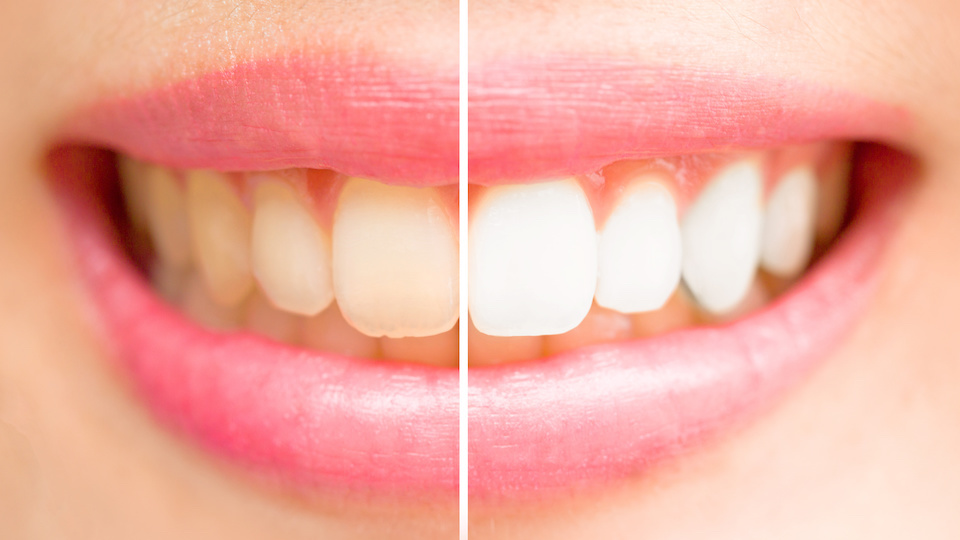It’s picture time. You know the drill, keep your mouth shut at all costs. Over the years, you have perfected the closed mouth smile for fear that your yellow teeth will get the better of you. No one wants to have yellow teeth, but the methods that we often use to whiten them can be dangerous. Both dental bleaching sessions and over-the-counter whitening treatments can lead to pain and other negative consequences for your smile.
The most common ingredient in dental office bleaching sessions is hydrogen peroxide, and the most common ingredient in at-home whitening treatment kits is carbamide peroxide. Many people who undergo whitening treatments with these chemicals report experiencing sensitivity, and some report experiencing intermittent extreme pain afterward.
Luckily, there are several natural ways to keep your pearly whites white. The following seven may surprise you.
Coconut oil
Yes, along with being extraordinary delicious and healthy as a food, coconut oil can also help whiten your teeth, and improve the condition of your teeth, gums, and mouth in general. This can be accomplished through a process called oil pulling, which has been used for thousands of years.
To oil pull with coconut oil, start with one tablespoon of organic, extra virgin coconut oil. Swish the coconut oil around your mouth in the morning for 10 to 15 minutes. Next, spit out the oil (preferably not into the sink, as it can lead to clogs), and brush as you normally do, using an organic or homemade toothpaste.
If you oil pull regularly, you may soon notice that your teeth are whiter. Oil pulling also has many health benefits for your entire body.
Baking soda
If your teeth are severely stained, and you’re looking for a whitening solution, it’s baking soda to the rescue. The process is simple: mix baking soda and water to make a thick paste and use this paste to brush your teeth for one week. Make sure to rinse thoroughly after you brush. You’ll soon notice that your teeth look significantly whiter.
Note: Don’t brush with baking soda for longer than a week, as this may lead to damaged tooth enamel. Stick to a week, and then wait a few months before doing it again.
Lemons
Lemons contain citric acid, and just eating them can help to remove some staining from your teeth. However, when mixed with baking soda, they can be even more effective. For a superpowered whitening treatment, mix equal parts lemon juice and baking soda, and use the mixture to brush your teeth.
As this mixture is very strong, don’t do this more than once a week, and give your teeth a break after a couple of weeks. Too much lemon juice and baking soda can have a negative effect on tooth enamel.
That’s right: simply eating crunchy, fresh fruits and vegetables can help remove stains from your teeth. This is because the act of chewing them helps to remove scraps of food and bacteria from your mouth. Their crispy texture also helps to remove surface stains gently.
There are many great crunchy fruits and veggies out there, such as carrots and apples, so load up your plate with fresh produce!
Strawberries
Another fruit to add to your tooth-whitening diet is the delicious strawberry. Strawberries may be one of the best fruits to munch on to whiten your teeth, thanks to their combination of vitamin C (citric acid, which helps to remove stains) and malic acid. The malic acid found in these summer fruits aids in removing surface stains from your teeth.
Banana peel
Gerry Curatola, a dentist based in New York says this about banana peels,
“You can use the inside of a banana peel, which is rich in potassium, magnesium, manganese and other minerals, to whiten teeth. The rich minerals in a banana are absorbed into your enamel and have healthy whitening effects.”
Curatola recommends rubbing a piece of ripe banana peel on your teeth for two minutes after brushing and flossing, before rinsing your mouth. Who knew?
This may be the most bizarre one of all, but it’s true: activated charcoal may help to whiten your teeth and improve the health of your mouth. It helps to rid your teeth of bacteria and balance the pH in your mouth, thus lowering your risk of oral diseases.
One great option to try is activated coconut charcoal. To use, mix the powder with a bit of water in a cup so that it forms a paste. Apply the paste to your teeth and leave on for just under five minutes. Spit and rinse. That’s it!









